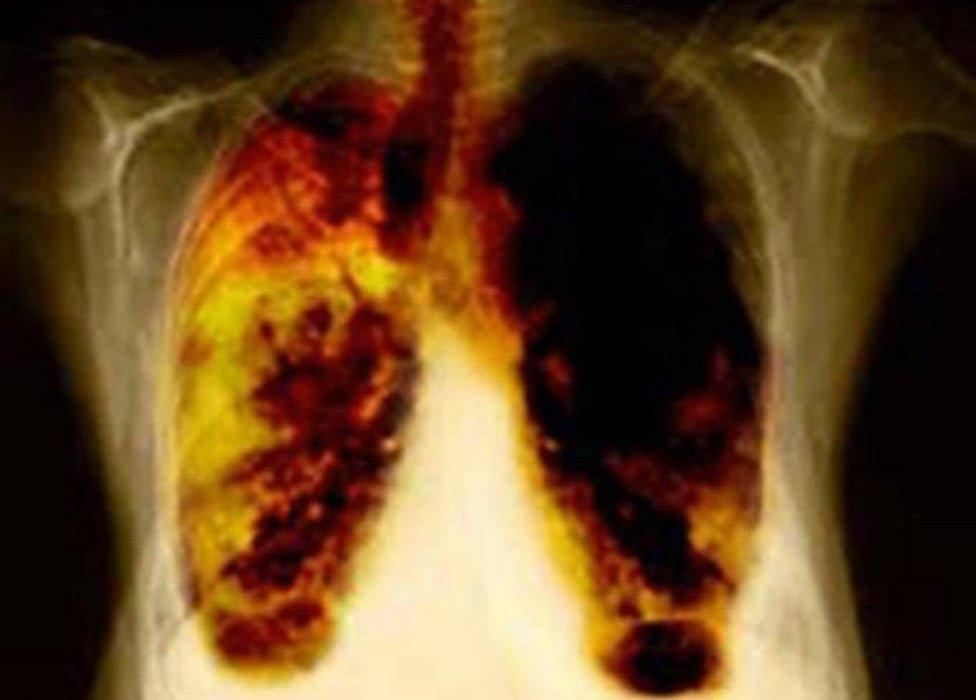Glasgow has highest lung disease death rate in Britain
- Published

The incidence of lung conditions in Scotland is blamed on historic smoking rates and heavy industry
Scotland's urban areas, particularly around Glasgow, have the highest lung disease mortality rates in Britain, a new report has found.
People living in the city are almost twice as likely to die from lung disease as those in Stirling, according to the British Lung Foundation (BLF).
The charity said historic smoking rates were partly to blame for the serious health problems.
But it believes heavy industry has also led to high rates of lung conditions.
The BLF has called on the Scottish government and NHS Scotland to set up an "independent taskforce" to produce a strategy for tackling lung health in Scotland.
Its report, The Battle for Breath: the Impact of Lung Disease in the UK, external, is the result of a three-year study.
It has been hailed as "the most comprehensive overview of lung disease in a decade".
The study's findings include:
Rates of chronic obstructive pulmonary disease (COPD) and lung cancer are highest in Scotland. The conditions are commonly caused by smoking
Scotland has higher rates of less common lung conditions like pneumoconiosis, caused by inhaling dusts and chemicals in the workplace
Parts of Scotland with a history of shipbuilding have high rates of the asbestos related cancer, mesothelioma
Scotland has among the highest rates in the UK of conditions such as asthma, sarcoidosis and idiopathic pulmonary fibrosis (IPF) - but reasons are unclear.
The UK-wide report reveals that lung disease is one of the UK's "big three" killers - alongside heart disease and cancer.
It found that one person dies of lung disease, and five more are diagnosed, every five minutes.

Rates of lung disease caused by smoking are highest in Scotland
The BLF has called for an end to the "systemic neglect" of lung disease by public health bodies.
It said Scotland is "making great progress" in some aspects of tackling lung disease, with lung cancer awareness campaigns and in tackling smoking.
But Irene Johnstone, Head of the British Lung Foundation Scotland, said thousands of people were dying every year from lung conditions not caused by tobacco.
'New treatments'
She added that any strategy to reduce lung cancer deaths in Scotland needed to be more wide-reaching.
"This is why we need a national improvement plan for lung health in Scotland, to look at the full range of options available for fighting lung disease - from better awareness, screening and prevention, to improved data collection and sharing, and more integrated care," she said.
"We have some of the UK's leading centres for lung disease research here in Scotland - let's invest in finding new treatments and cures to improve our lung health.
"At the moment, we have the some of the highest rates of lung disease. But with the right attention from government and public health bodies, we can absolutely turn that round and lead the other countries in the UK and across Europe".
The Scottish government said while lung cancer remained the most common cancer in Scotland, it had fallen 14% in men and 11% in women.
A spokeswoman said the government was committed to creating a "tobacco-free generation" by 2034.
She added: "The Scottish government is working with a range of stakeholders including the Respiratory National Advisory Group to support improvement in care for people living in Scotland with the wide range of respiratory conditions."
- Published14 January 2016

- Published13 April 2012

- Published17 December 2010